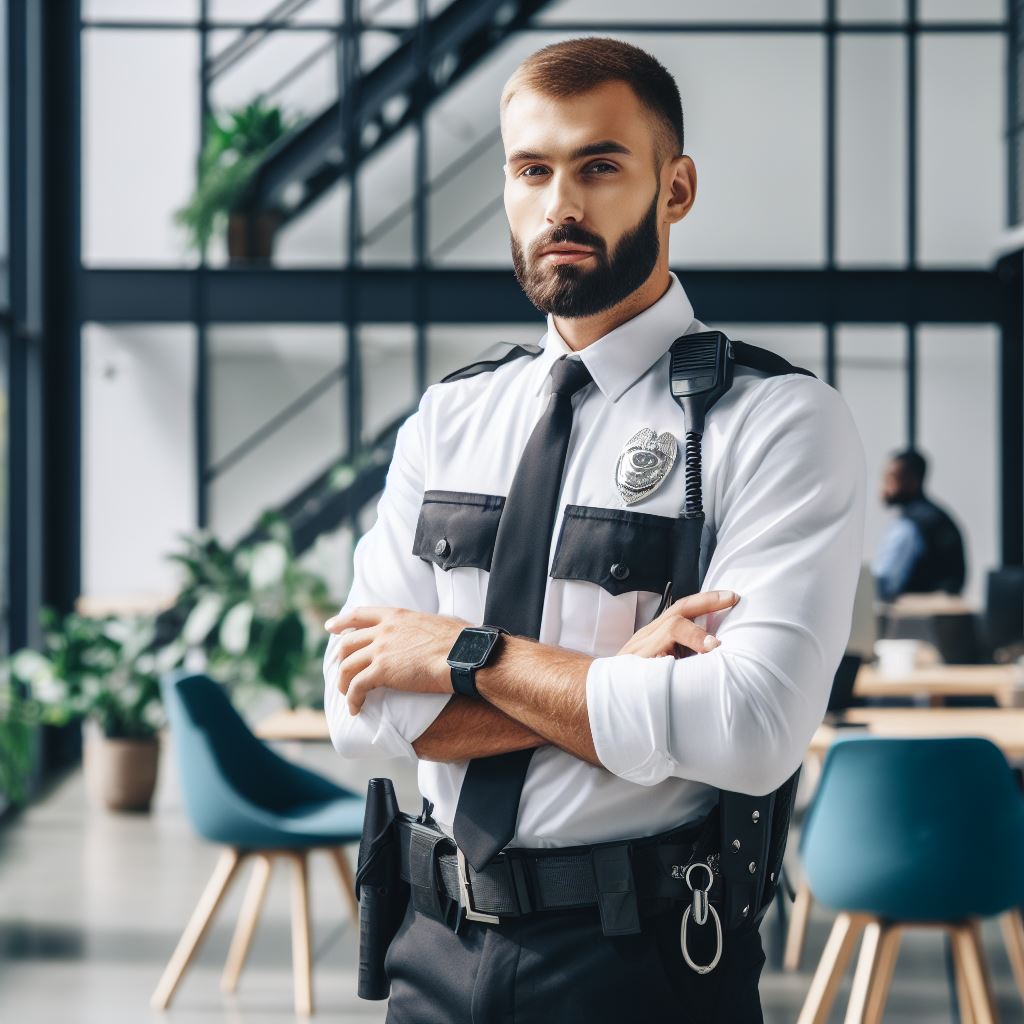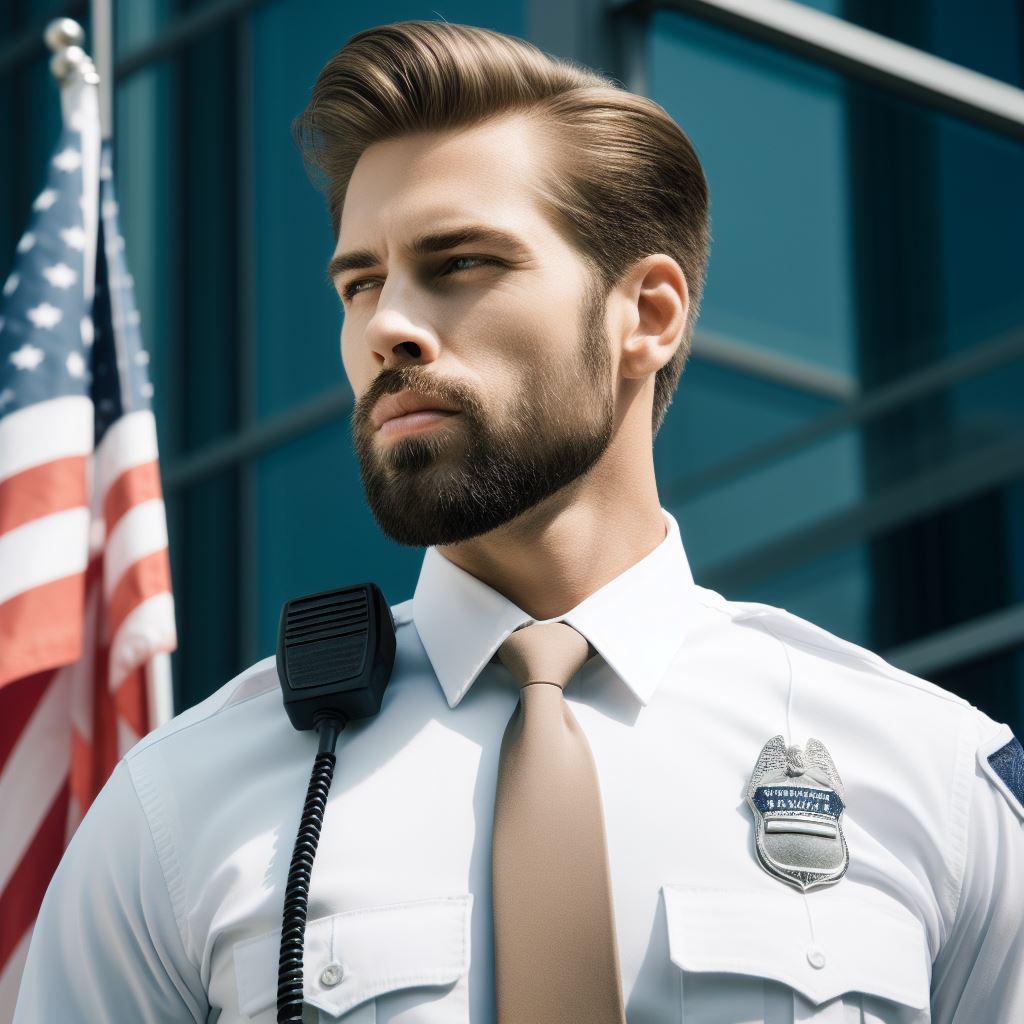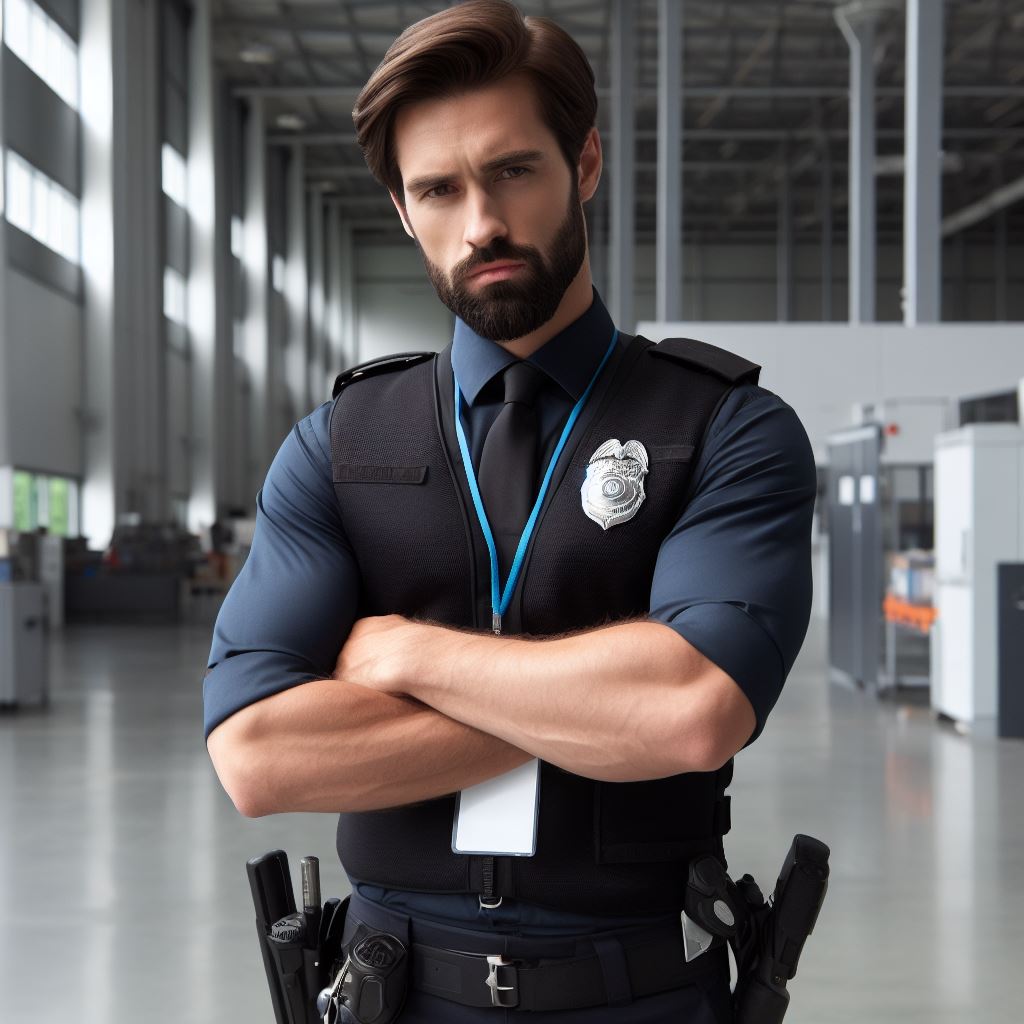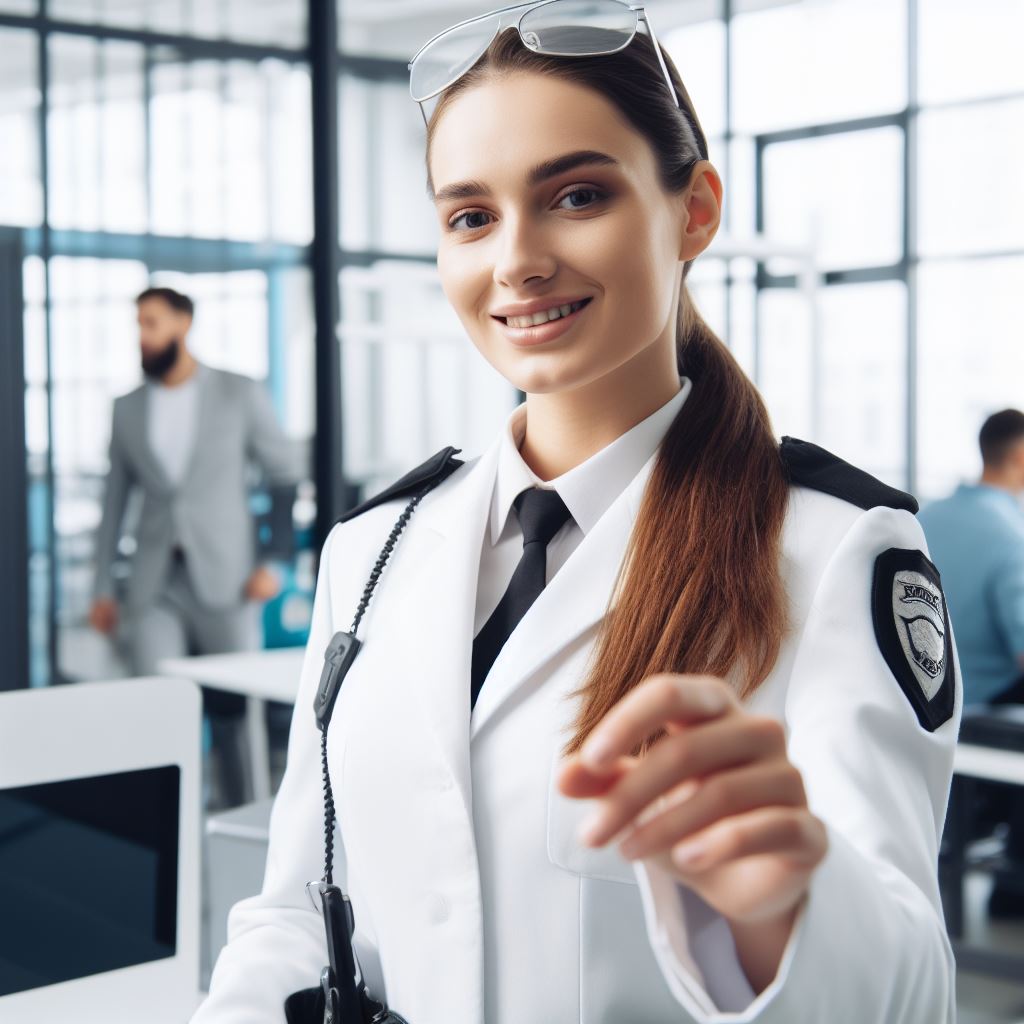Introduction
Embarking on a comprehensive exploration of the essential skills that distinguish top-tier security guards in the United States, this section invites readers into the dynamic realm of security operations.
In a nation marked by diverse landscapes, cultures, and security challenges, the proficiency of security personnel becomes a linchpin for maintaining safety and order.
Navigating the multifaceted demands of this profession, we highlight the paramount importance of honing skills tailored to unique challenges in diverse USA environments.
From the high-paced urban jungles to the tranquility of rural settings, the role of security guards remains not only significant but also ever-evolving.
Join us on an in-depth journey, unraveling the expertise contributing to the effectiveness of security personnel across the nation.
As we delve into the intricacies of these skills, it becomes evident that they are not just valuable but truly indispensable in the ever-changing landscape of security and public safety.
Physical Fitness and Endurance
Physical fitness and endurance are essential skills that every security guard in the USA should master.
The nature of their job requires them to be in top physical condition in order to effectively carry out their duties and ensure the safety of others.
Significance of Physical Fitness and Endurance
Physical fitness and endurance play a vital role in the effectiveness of security guards.
Being physically fit allows them to endure long hours of standing or patrolling, often in challenging environments.
This job demands agility, strength, and stamina, all of which are enhanced through regular exercise and training.
Security guards often find themselves in situations that require quick decision-making and swift action.
By being physically fit, they are better equipped to handle emergencies and respond effectively to any threats or incidents that may arise.
Additionally, physical fitness contributes to mental sharpness and overall alertness, enabling guards to remain focused and attentive to their surroundings.
Physical Demands of the Job
The role of a security guard involves various physical demands.
They may be required to conduct regular patrols, monitor surveillance systems, enforce access control, or restrain individuals if necessary.
These tasks demand physical agility, strength, and flexibility.
Security guards often work long shifts that can be physically exhausting.
They may need to stand or walk for several hours without breaks, which can take a toll on their bodies.
Proper physical fitness and endurance enable guards to withstand the demands of their job and perform their duties optimally throughout their shift.
Enhancing Performance through Fitness
Being physically fit can significantly enhance a security guard’s performance.
Regular exercise and conditioning exercises improve overall strength and cardiovascular endurance, enabling guards to meet the physical demands of their job with ease.
Examples of exercises and activities that can improve physical fitness in security guards include:
- Aerobic exercises such as running, swimming, or cycling to improve cardiovascular endurance.
- Strength training exercises like weightlifting or bodyweight exercises to build muscle strength.
- Flexibility training through stretching exercises to enhance agility and prevent injuries.
- Interval training to simulate the intensity and unpredictability of real-life security situations.
Security guards can also engage in sports or recreational activities that require physical exertion, such as martial arts or team sports.
These activities not only enhance physical fitness but also contribute to the development of teamwork, discipline, and mental focus.
Most importantly, physical fitness and endurance are crucial skills for security guards in the USA.
By maintaining good physical health and fitness levels, guards can ensure their own safety as well as the safety of the people they protect.
Regular exercise and training should be an integral part of every security guard’s routine to excel in their demanding profession.
Observation and Awareness
Security guards play a crucial role in maintaining public safety, and one of the essential skills they should master is observation and awareness.
Being able to observe their surroundings and stay alert to potential threats is vital in ensuring the safety of people and property.
In this section, we will discuss the importance of these skills for security guards and provide tips on how to enhance observation skills and increase awareness.
Importance of Observation and Awareness
Observation and awareness are the foundation of effective security guarding.
Security guards need to have a keen eye for detail and be constantly vigilant to identify any suspicious activities or potential threats.
By being observant and aware, security guards can detect and respond to incidents in a timely manner, preventing harm or damage.
These skills are essential for maintaining a secure environment and ensuring the safety of everyone within it.
Identifying Potential Threats
Being alert and perceptive in identifying potential threats is crucial for security guards.
By closely observing their surroundings, they can identify suspicious behavior, unfamiliar faces, or unusual objects that may indicate a threat.
These could include individuals displaying aggressive behavior, attempting unauthorized access, or carrying suspicious packages.
The ability to quickly recognize and report such threats helps prevent security breaches and potential acts of violence or terrorism.
Tips for Enhancing Observation Skills and Increasing Awareness
- Stay Focused: Avoid distractions and maintain focus on the area you are responsible for. Keep your attention on the people and activities around you.
- Use all Senses: Observation extends beyond just seeing. Utilize all your senses, such as hearing for unusual sounds or smelling for unusual odors, as they can provide additional cues for potential threats.
- Scan the Environment: Regularly scan your surroundings, paying attention to both the immediate area and any potential blind spots.
- Develop a Baseline: Establish a baseline of normal activity for the location you are guarding so that you can easily spot any deviations or anomalies.
- Practice Situational Awareness: Be aware of the overall situation and anticipate potential threats or hazards. Assess the risks and adjust your observation accordingly.
- Keep a Safe Distance: Maintain a safe distance from potential threats while still being able to observe them effectively. This ensures your own safety while gathering critical information.
- Continuous Training: Regularly participate in training programs that focus on observation and awareness. These programs can sharpen your skills and keep you up-to-date with the latest techniques and practices.
- Communication is Key: Develop effective communication skills to relay any observations or potential threats to the appropriate authorities or colleagues promptly.
- Stay Informed: Keep up with security-related news and events to understand current trends, modus operandi, and potential threats specific to your area of responsibility.
- Trust Your Gut: If something feels off or suspicious, trust your instincts. Your intuition can often alert you to potential dangers that may not be immediately apparent.
By mastering observation and awareness skills, security guards can play a crucial role in deterring crimes, mitigating risks, and ensuring a safe environment in the USA.
These skills provide the foundation for effective security measures and contribute to the overall well-being of individuals and communities.
Communication Skills
The significance of effective communication for security guards
Effective communication plays a crucial role in the success of security guards in the USA.
It is the foundation of their job and ensures the safety and security of the people and premises they are responsible for.
The importance of clear and concise communication in various situations
Clear and concise communication is vital in various situations, as it helps security guards convey information accurately and efficiently.
Whether it’s responding to emergencies or maintaining order, effective communication can make a significant difference.
Examples of communication techniques that can be useful for security guards
Here are some examples of communication techniques that can be useful for security guards:
Verbal Communication
Security guards must possess excellent verbal communication skills to interact with the public, colleagues, and clients.
They should speak clearly, use appropriate language, and convey information effectively.
Transform Your Career Today
Unlock a personalized career strategy that drives real results. Get tailored advice and a roadmap designed just for you.
Start NowActive Listening
Security guards should be active listeners, paying attention to details and understanding information accurately.
This skill helps them respond appropriately and gather essential information during incidents.
Non-Verbal Communication
Body language and facial expressions are essential non-verbal communication tools for security guards.
They can convey authority, assertiveness, and presence, displaying confidence and deterring potential threats.
Radio Communication
In many instances, security guards need to communicate with their team members or other authorities using radio systems.
Knowing how to use radios effectively, including proper etiquette and codes, is vital for clear and efficient communication.
Written Communication
Security guards often need to write incident reports, maintain logs, and document important information.
Having good writing skills ensures that their reports are clear, concise, and accurate, providing valuable records for future reference.
Cultural Sensitivity
The ability to communicate effectively with individuals from diverse backgrounds is crucial for security guards.
Being culturally sensitive and adapting communication styles accordingly helps prevent misunderstandings and fosters positive interactions.
Conflict Resolution
Security guards often find themselves in situations that require defusing conflicts and managing confrontations.
Effective communication skills enable them to calmly and assertively communicate with parties involved to find peaceful resolutions.
Emergency Communication
During emergencies, security guards must communicate clearly and quickly to ensure the safety of everyone involved.
The ability to transmit accurate information and follow emergency protocols is essential in these high-pressure situations.
All in all, effective communication skills are vital for security guards in the USA.
Clear and concise communication allows them to convey information accurately, respond to emergencies efficiently, and maintain order in various situations.
By mastering these communication techniques, security guards can excel in their role and ensure the safety and security of the people and properties they protect.
Conflict Management and De-escalation Techniques
The Importance of Conflict Management Skills for Security Guards
In the demanding profession of security guarding, conflict management is a crucial skill that every guard should master.
In managing conflicts, security guards play a crucial role, impacting safety and well-being in various situations.
The Significance of De-escalation Techniques in Diffusing Volatile Situations
De-escalation techniques play a crucial role in diffusing potentially volatile situations.
When faced with an escalating conflict, security guards need to prioritize calming tensions and reducing aggression, rather than exacerbating the situation.
By successfully utilizing de-escalation techniques, guards can prevent situations from spiraling out of control, thereby ensuring the safety of everyone involved.
Strategies and Tips for Effective Conflict Resolution and De-escalation
To excel in conflict resolution and de-escalation, security guards can implement various strategies and follow essential tips:
Remain Calm and Composed
It is essential for security guards to remain calm and composed during conflict situations. By staying level-headed, guards can better assess the situation and make rational decisions.
Active Listening
Security guards should actively listen to all parties involved in the conflict. By understanding their perspectives, guards can empathize and find common ground for resolution.
Maintain Non-confrontational Body Language
Non-confrontational body language, such as keeping an open stance and avoiding aggressive gestures, can help de-escalate tensions and create a more conducive atmosphere for resolving conflicts.
Use Effective Communication
Guards should communicate clearly and concisely to effectively convey their intentions and expectations. Using a calm and assertive tone can help diffuse volatile situations.
Identify Triggers and React Appropriately
Understanding the triggers that escalate conflicts can aid security guards in effectively managing these situations. By recognizing potential triggers, guards can react appropriately and prevent further escalation.
Seek Mediation and Involve Authorities if Necessary
When conflicts become challenging to resolve, security guards should seek mediation and involve higher authorities or law enforcement if needed. This ensures a fair and unbiased resolution.
Continuous Training and Improvement
Security guards should continuously seek training and improvement in conflict management skills.
Participating in workshops and educational programs allows guards to stay updated with the best practices in de-escalation techniques.
Document and Report Incidents
Proper documentation of conflict incidents is crucial for analyzing patterns, identifying areas of improvement, and ensuring accountability. Security guards should maintain accurate and detailed incident reports.
Self-care and Stress Management
Conflicts can be stressful for security guards.
Practicing self-care and stress management techniques, such as exercise, meditation, and seeking support from peers, can help guards maintain their well-being and effectiveness.
Transform Your Career Today
Unlock a personalized career strategy that drives real results. Get tailored advice and a roadmap designed just for you.
Start NowConflict management and de-escalation techniques are essential skills that every security guard should master.
Understanding conflict management, employing de-escalation techniques, and implementing effective strategies allow security guards to ensure a secure environment.
Read: Fire Department Hierarchies: From Rookie to Chief
Emergency Response and First Aid
The crucial role of security guards in emergency situations
Security guards play a crucial role in emergency situations, as they are often the first line of defense and the first to respond to these incidents. Their quick and efficient response can save lives and minimize damage.
The importance of being trained in basic first aid and emergency response procedures
Being trained in basic first aid and emergency response procedures is of utmost importance for security guards.
This training equips them with the necessary skills to assess, provide aid, and take appropriate action in emergency situations.
Examples of essential first aid skills and emergency response protocols
Here are some essential first aid skills and emergency response protocols that every security guard should master:
CPR and AED Training
Cardiopulmonary resuscitation (CPR) training is essential as it enables security guards to perform life-saving measures when someone’s heart suddenly stops.
They must be proficient in providing chest compressions and rescue breaths.
Additionally, training in automated external defibrillators (AED) is crucial as using this device can significantly increase the survival rate of individuals experiencing cardiac arrest.
Bleeding Control Techniques
Security guards should receive training in controlling bleeding effectively. This includes learning how to apply direct pressure, use tourniquets, and pack wounds to stop excessive bleeding in emergency situations.
Knowing different bleeding control techniques can prevent a victim from going into shock due to blood loss and can buy precious time until professional medical help arrives.
Choking Response
Being trained in handling choking emergencies is vital for security guards. They should master the Heimlich maneuver, a technique used to help dislodge an obstruction from a person’s airway.
Quickly and effectively assisting a choking victim can potentially save their life before advanced medical help arrives.
Basic Wound Care
Security guards often encounter individuals with minor injuries or wounds. Knowing how to clean and dress wounds appropriately can prevent infection and further complications.
Proper wound care includes cleaning the wound, applying antiseptic solutions, and securing the wound with sterile bandages or dressings.
Fire Safety and Evacuation
Emergency situations frequently involve fires, and security guards must be trained in fire safety protocols and evacuation procedures.
They should understand how to operate fire extinguishers and guide people to safety during fire emergencies. Their knowledge of evacuation routes and procedures is crucial for ensuring everyone’s safety.
Communication and Reporting
During emergency situations, security guards must effectively communicate with emergency responders, relay critical information, and provide accurate incident reports.
They should be trained in using two-way radios, emergency alarm systems, and understand the importance of clear and concise communication during high-stress situations.
Psychological First Aid
Psychological first aid is another important aspect of emergency response training for security guards. They must be able to provide emotional support and assist individuals in distress.
Security guards should have the skills to identify signs of trauma, offer reassurance, and provide appropriate resources to individuals affected by the emergency.
Ultimately, security guards play a critical role in emergency situations, and being trained in basic first aid and emergency response procedures is vital for their effectiveness.
The mastery of essential first aid skills and emergency response protocols equips them with the necessary tools to provide immediate assistance, save lives, and ensure public safety.
Transform Your Career Today
Unlock a personalized career strategy that drives real results. Get tailored advice and a roadmap designed just for you.
Start NowRead: Rituals and Traditions in U.S. Firefighting Culture
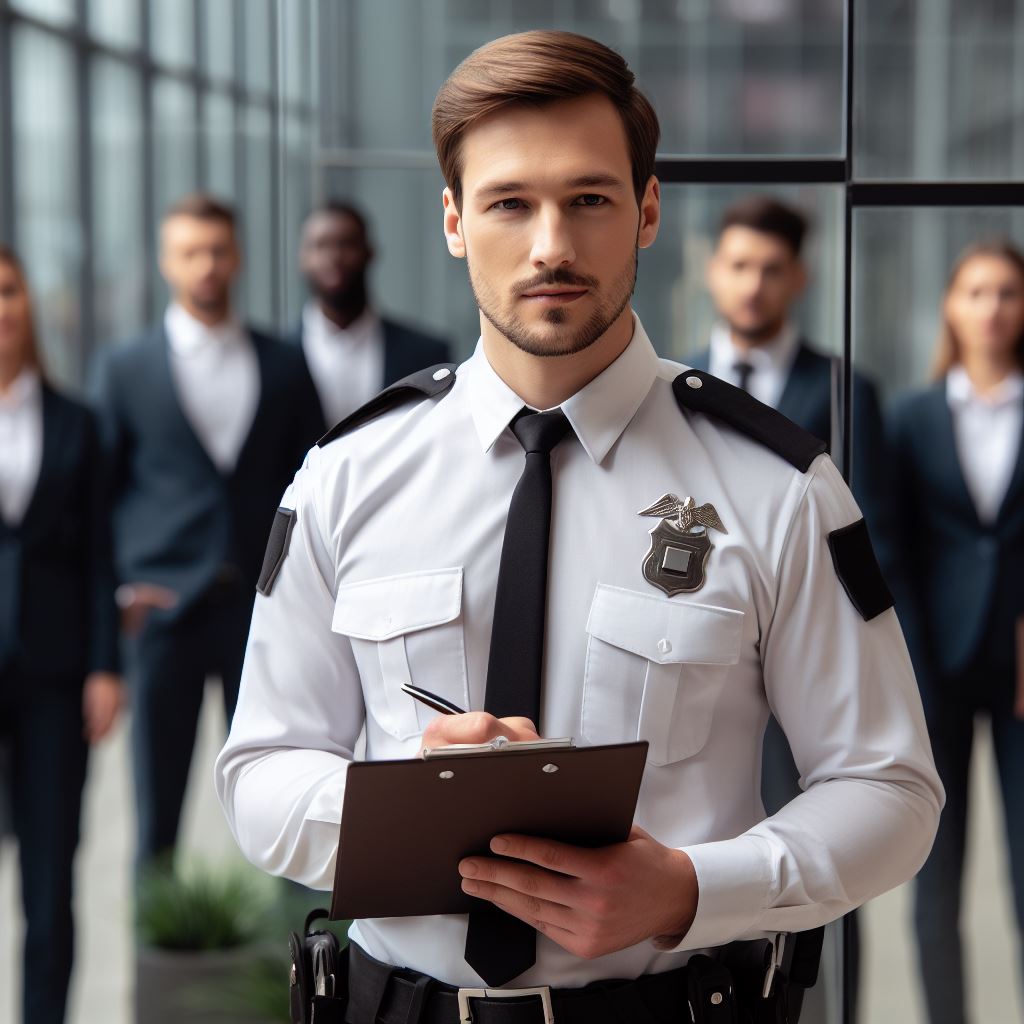
Learn More: Legal Boundaries: What US Detectives Can and Can’t Do
See Related Content: Pros and Cons: Being a Security Guard in the United States
You Might Also Like: Emergency Response: Role of Bomb Squad Technicians
Knowledge of Laws and Regulations
The necessity for security guards to have a thorough understanding of laws and regulations
Security guards play a crucial role in maintaining order and ensuring the safety of individuals and property.
In order to effectively fulfill their responsibilities, security guards must have a thorough understanding of laws and regulations.
Relevant laws and regulations that security guards should be familiar with in the USA
Having knowledge of laws and regulations is essential for security guards for several reasons. First and foremost, it helps them perform their duties within the boundaries of the law.
By understanding the legal framework in which they operate, security guards can ensure that their actions are lawful and avoid unnecessary legal complications.
Furthermore, being familiar with laws and regulations allows security guards to effectively respond to different situations.
They can confidently handle incidents, diffuse conflicts, and take appropriate actions based on their legal knowledge.
So, what are some relevant laws and regulations that security guards should be familiar with in the United States?
The Fourth Amendment
The Fourth Amendment of the U.S. Constitution protects against unreasonable searches and seizures.
Security guards must understand the limitations imposed by this amendment while performing their duties.
Trespassing Laws
Trespassing laws vary from state to state, so security guards should be aware of the specific laws and regulations in their jurisdiction.
This knowledge helps them identify and handle trespassers appropriately.
Use of Force Laws
Security guards should have a clear understanding of the laws regarding the use of force.
They need to know when and how they can use force to protect themselves or others without crossing legal boundaries.
Privacy Laws
As security guards may come across situations involving privacy concerns, understanding privacy laws is crucial. This knowledge helps them respect individuals’ privacy while still ensuring security.
Employment Laws
Security guards should also be familiar with labor laws. This knowledge helps them ensure fair treatment of employees and understand their own rights and obligations as security professionals.
Resources or tips for staying updated on the latest laws and regulations in the field
Staying updated on the latest laws and regulations in the field is of utmost importance for security guards. Here are some resources and tips to help them stay informed:
Government Websites
Government websites at both federal and state levels provide access to laws and regulations. Security guards can regularly check these websites for updates and changes.
Training and Certification Programs
Enrolling in training and certification programs specific to the security industry can provide security guards with updated knowledge of laws and regulations.
Professional Associations and Networks
Joining professional associations and networks related to security can help security guards stay connected with industry experts and receive timely updates on legal matters.
Continuous Education
Security guards should engage in continuous education by attending seminars, workshops, and conferences, where they can learn about the latest developments in laws and regulations.
In review, security guards must master the essential skill of understanding laws and regulations.
Being well-versed in the legal framework of their profession enables them to provide effective security services while staying within the boundaries of the law.
By staying updated and informed, security guards can perform their duties diligently and contribute to a safer environment for all.
Read: Rituals and Traditions in U.S. Firefighting Culture
Transform Your Career Today
Unlock a personalized career strategy that drives real results. Get tailored advice and a roadmap designed just for you.
Start NowCritical Thinking and Problem-Solving
As a security guard, it is crucial to possess a range of skills to ensure effective protection and response to various situations.
Among these skills, critical thinking and problem-solving abilities take center stage. They play a vital role in the success of security operations and are essential for security guards to master.
Importance of Critical Thinking and Problem-Solving Skills for Security Guards
The ability to think critically and solve problems is fundamental for security guards as they face unpredictable circumstances regularly.
Here‘s why these skills are so crucial:
- Effective Decision Making: Critical thinking allows security guards to evaluate situations objectively, aiding in better decision-making.
- Identifying Security Vulnerabilities: Problem-solving skills help security guards analyze potential vulnerabilities and devise appropriate measures to mitigate risks.
- Adapting to Changing Environments: Critical thinking enables security guards to quickly analyze and adapt to evolving security threats.
- Conflict Resolution: Problem-solving abilities help security guards mediate conflicts and prevent escalation.
- Enhanced Communication: Critical thinking improves communication skills, allowing security guards to articulate their thoughts effectively.
Situations Requiring Critical Thinking and Problem-Solving
There are numerous scenarios where security guards must apply their critical thinking and problem-solving skills:
- Threat Assessments: Assessing potential security vulnerabilities in a facility and implementing appropriate preventive measures.
- Emergency Response: Quickly analyzing a crisis situation and making decisions to ensure the safety of individuals.
- Dealing with Difficult Individuals: Resolving conflicts with agitated individuals in a calm and controlled manner.
- Detecting Suspicious Activities: Identifying and investigating activities that may pose a security threat to the premises.
- Handling Security Breaches: Devising suitable courses of action to address security breaches and minimize their impact.
Developing Critical Thinking and Problem-Solving Skills
Security guards can adopt various strategies to enhance their critical thinking and problem-solving abilities:
- Continuing Education: Pursue further education or specialized training programs to develop critical thinking skills.
- Engage in Scenario-based Training: Participate in simulated exercises to sharpen problem-solving skills in realistic situations.
- Seek Mentoring: Learn from experienced security professionals who can guide you in developing these skills.
- Stay Updated: Keep abreast of the latest security trends and technology to anticipate potential challenges.
- Practice Reflection: Regularly evaluate past incidents and analyze how critical thinking and problem-solving were utilized.
Examples of how security guards can apply these skills
- During routine patrols, security guards can critically observe their surroundings to spot any unusual activities.
- In emergency situations, security guards can quickly analyze the severity and take appropriate action.
- When faced with an angry or disruptive individual, security guards can calmly and diplomatically resolve the conflict.
- Security guards can proactively identify potential security vulnerabilities and recommend preventive measures.
- Following a security breach, security guards can investigate the incident, identify the root cause, and propose measures to prevent recurrence.
Mastering critical thinking and problem-solving skills is essential for security guards to excel in their role.
These skills empower them to not only safeguard lives and property but also contribute to the overall security of the premises they protect.
Read: Balancing Personal Life & Policing: Officer Stories
Conclusion
To summarize, the essential skills discussed in this blog post are crucial for security guards in the USA.
These skills include effective communication, situational awareness, observation, conflict resolution, and physical fitness.
It is important for security guards to master these skills as they directly impact their ability to protect and maintain safety.
By investing in mastering these skills, aspiring or current security guards can enhance their professional abilities and excel in their roles.
Whether it is dealing with emergencies, preventing theft, or ensuring the security of individuals, these skills play a vital role.
Aspiring or current security guards should prioritize developing these skills to provide effective security services and ensure the safety of people and property.
Remember, mastering these skills is not only beneficial for a security career but also for personal growth.
So, take the initiative to improve and excel in these areas, and become an invaluable asset in the field of security.
Start developing these essential skills today and make a difference in the security industry.

